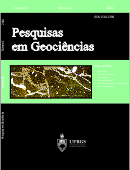Petrographic and geochemical characterization of the magmatic sequence of Seival Mine, Hilario Formation (Neoproterozoic Camaquã Basin), Rio Grande do Sul, Brazil
DOI:
https://doi.org/10.22456/1807-9806.78035Keywords:
Seival Mine, Hydrothermal alteration, Shoshonitic magmatism, Petrography, Copper deposits, Geochemistry, Camaquã Basin.Abstract
The Seival Mine consists of andesitic volcanic and trachy-andesitic volcanic and hipabissal rocks grouped into two volcanic sequences. The Sequence I is composed of pyroclastic rocks and effusive rocks, and sequence II by andesite dikes. The area shows intense hydrothermal alteration and Cu mineralization. This magmatism is related to the post-collisional stage of the cycle Brasiliano/Pan-African, and it is stratigraphically positioned in the Bom Jardim Allogroup, Hilário Formation, which is part of the Neoproterozoic Camaquã Basin. Sequence II magmatism and mineralization are controlled by tectonic structures with N/NE and NW orientation, which are related to regional extension during the post-collisional stage of Brasiliano/Pan-African Orogeny. Processes involving different temperatures caused pervasive alteration products, with generation of chlorite, corrensite and smectite, with veins filled by quartz, carbonate, barite and copper minerals. In both sequences of Seival Mine is possible to identify the shoshonitic affinity of host sequences, as pointed out by geochemical data. The higher contents of Cu, Zn, and Ni in andesite dikes in relation to pyroclastic and effusive rocks, even in the hydrothermally altered types, suggest that the main Cu mineralizations have magmatic origin. The Au and Cu contents are higher in samples with lower carbonate concentrations, which suggests than carbonate alteration have no relation with ore deposition.Downloads
Download data is not yet available.
Downloads
Published
2014-04-27
How to Cite
LOPES, R. W., FONTANA, E., MEXIAS, A. S., GOMES, M. E., NARDI, L. V., & RENAC, C. (2014). Petrographic and geochemical characterization of the magmatic sequence of Seival Mine, Hilario Formation (Neoproterozoic Camaquã Basin), Rio Grande do Sul, Brazil. Pesquisas Em Geociências, 41(1), 51–64. https://doi.org/10.22456/1807-9806.78035
Issue
Section
Articles



